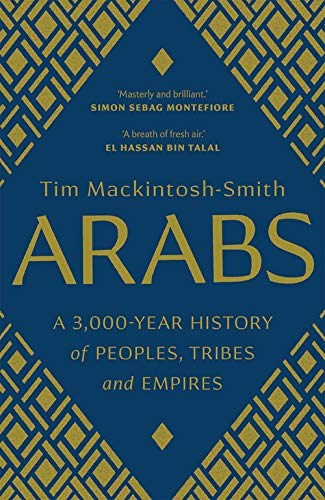Arabs. A 3,000-Year History of Peoples, Tribes and Empires
Tim Mackintosh-Smith, Yale University Press, 630 pages.
This almost exhaustingly comprehensive work is a must for anyone with an interest in the history and nature of the Arab world.
Mackintosh-Smith lived in Yemen from 1982 until 2019 when the civil war there forced him to relocate. He is fluent in Arabic and clearly loves the language and people.
The number of pages spent on pre-Islamic history could perhaps have been pruned, but the descriptions of the origin and growth of Islam and its importance for the Arabic language is clearly set out.
Mohammed was a major figure in the spread of literacy and it is due to him that Arabic and Islam have become almost synonymous.
The problem with printed books, in contrast to those written by hand, was that Arabic script wasn’t exactly printer-friendly and the use of detached, separate letters delayed the use of printed books in this language. Still, it was interesting to read that the first printed book in Arabic – ie, not hand-written - was a book of Christian psalms.
The reason for the problems with printed Arabic was the protean nature of the script. The singe Arabic letter “sad” has 37 forms, the common letter “mim” has 73 forms, while the Latin equivalent has only two forms: M and m. The appearance of computers facilitated things considerably.
The sharp political divisions in the Arab world are mitigated by the shared language which gives a sense of cultural identity, although the language itself is often too complex for many of its speakers: “Not all could use the tongue themselves, by any means, or even understand it in its complex entirety; but all could appreciate it, aspire to it, and respond to it. It was this shared response that made them Arab. Today, the shared response still links Arabs everywhere: they inhabit the same kulturnation; they love the language, even if they hate having to learn its grammar.”
However, just after that, one reads the following: “Political unity is still unthinkable…”
According to Mackintosh-Smith Arabic is lavishly endowed with poetry, partly because of a rich poetic tradition and partly because of the language itself. Arabic has 80 words for honey, 200 for beard, 500 for lion, 800 for sword and 1 000 for camel. With his tongue only partly in his cheek, Mackintosh-Smith writes: “The last figure seems if anything rather low: an old saw among Arabists that says every Arabic word means three things – itself, its opposite and a camel – is not entirely untrue. There are precise terms for such things that one would never imagine needed a precise term, like the droppings of bustards as opposed to ostriches, and different types of farts, categorized by loudness, and the sound of locusts eating, and the spaces between fingers, each space having its own term.”
In fact, poetry is so common among Arabs that political figures (past and present) often use verse as a means of attacking an opponent.
At one stage Arabs controlled an enormous empire, stretching from Spain, Egypt, the Arabian Peninsula and Middle East, to today’s Iran, Afghanistan and Turkey, and this is just a part of their territory. It was then the center of the Old World and their influence was felt far and wide: in 774 king Offa of England had a gold coin struck with the words “Mohammed is the messenger of Allah” inscribed on it. English has borrowed about 200 words from Arabic, e.g., cheque, carafe, alcohol and algebra.
It is generally known that Arabs kept the flame of learning glowing during the Middle Ages. Their approach was that of a liberal society, keen to investigate new ideas and to foster debate and freedom of speech. I would have liked a more detailed investigation of the reasons for the subsequent decline.
The last few chapters are devoted to a discussion of the contemporary political history and the reasons for the millennia-old fragmentation and repeated disputes (and sometimes violence) in the Arab world. Mackintosh-Smith clearly loves Arab society and its cultural treasures and I could discern an undertone of despair in these passages.
This subject may not interest many people, but for me it was a fascinating journey through countries old and new, languages and histories, meeting many interesting personalities along the way. I was astounded by how well-read the author is, not just about Arab culture and past but also Western cultural history. His smooth and at times humorous style made the book a pleasure to read.
The views and opinions expressed in this article are those of the author, and do not necessarily reflect the position of this publication.




